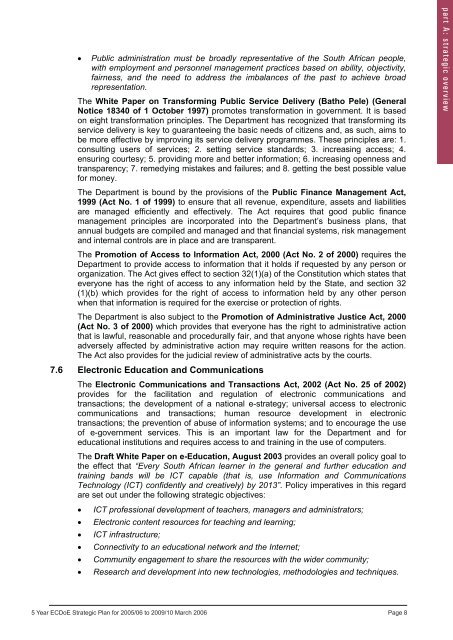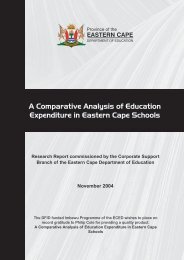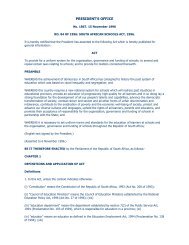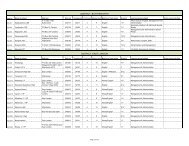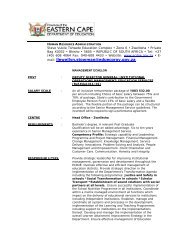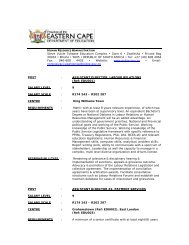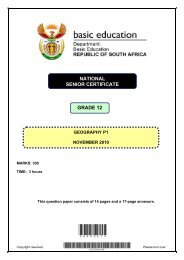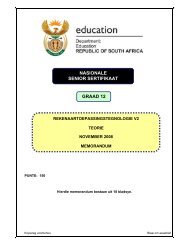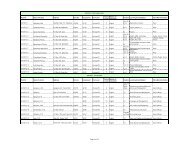5 Year Strategic Plan 2005/06 - Department of Education
5 Year Strategic Plan 2005/06 - Department of Education
5 Year Strategic Plan 2005/06 - Department of Education
You also want an ePaper? Increase the reach of your titles
YUMPU automatically turns print PDFs into web optimized ePapers that Google loves.
Public administration must be broadly representative <strong>of</strong> the South African people,<br />
with employment and personnel management practices based on ability, objectivity,<br />
fairness, and the need to address the imbalances <strong>of</strong> the past to achieve broad<br />
representation.<br />
The White Paper on Transforming Public Service Delivery (Batho Pele) (General<br />
Notice 18340 <strong>of</strong> 1 October 1997) promotes transformation in government. It is based<br />
on eight transformation principles. The <strong>Department</strong> has recognized that transforming its<br />
service delivery is key to guaranteeing the basic needs <strong>of</strong> citizens and, as such, aims to<br />
be more effective by improving its service delivery programmes. These principles are: 1.<br />
consulting users <strong>of</strong> services; 2. setting service standards; 3. increasing access; 4.<br />
ensuring courtesy; 5. providing more and better information; 6. increasing openness and<br />
transparency; 7. remedying mistakes and failures; and 8. getting the best possible value<br />
for money.<br />
The <strong>Department</strong> is bound by the provisions <strong>of</strong> the Public Finance Management Act,<br />
1999 (Act No. 1 <strong>of</strong> 1999) to ensure that all revenue, expenditure, assets and liabilities<br />
are managed efficiently and effectively. The Act requires that good public finance<br />
management principles are incorporated into the <strong>Department</strong>’s business plans, that<br />
annual budgets are compiled and managed and that financial systems, risk management<br />
and internal controls are in place and are transparent.<br />
The Promotion <strong>of</strong> Access to Information Act, 2000 (Act No. 2 <strong>of</strong> 2000) requires the<br />
<strong>Department</strong> to provide access to information that it holds if requested by any person or<br />
organization. The Act gives effect to section 32(1)(a) <strong>of</strong> the Constitution which states that<br />
everyone has the right <strong>of</strong> access to any information held by the State, and section 32<br />
(1)(b) which provides for the right <strong>of</strong> access to information held by any other person<br />
when that information is required for the exercise or protection <strong>of</strong> rights.<br />
The <strong>Department</strong> is also subject to the Promotion <strong>of</strong> Administrative Justice Act, 2000<br />
(Act No. 3 <strong>of</strong> 2000) which provides that everyone has the right to administrative action<br />
that is lawful, reasonable and procedurally fair, and that anyone whose rights have been<br />
adversely affected by administrative action may require written reasons for the action.<br />
The Act also provides for the judicial review <strong>of</strong> administrative acts by the courts.<br />
7.6 Electronic <strong>Education</strong> and Communications<br />
The Electronic Communications and Transactions Act, 2002 (Act No. 25 <strong>of</strong> 2002)<br />
provides for the facilitation and regulation <strong>of</strong> electronic communications and<br />
transactions; the development <strong>of</strong> a national e-strategy; universal access to electronic<br />
communications and transactions; human resource development in electronic<br />
transactions; the prevention <strong>of</strong> abuse <strong>of</strong> information systems; and to encourage the use<br />
<strong>of</strong> e-government services. This is an important law for the <strong>Department</strong> and for<br />
educational institutions and requires access to and training in the use <strong>of</strong> computers.<br />
The Draft White Paper on e-<strong>Education</strong>, August 2003 provides an overall policy goal to<br />
the effect that “Every South African learner in the general and further education and<br />
training bands will be ICT capable (that is, use Information and Communications<br />
Technology (ICT) confidently and creatively) by 2013”. Policy imperatives in this regard<br />
are set out under the following strategic objectives:<br />
c p o a n r t e A n : t s t r a t e g i c o v e r v i e w<br />
<br />
<br />
<br />
<br />
<br />
<br />
ICT pr<strong>of</strong>essional development <strong>of</strong> teachers, managers and administrators;<br />
Electronic content resources for teaching and learning;<br />
ICT infrastructure;<br />
Connectivity to an educational network and the Internet;<br />
Community engagement to share the resources with the wider community;<br />
Research and development into new technologies, methodologies and techniques.<br />
5 <strong>Year</strong> 5 ECDoE <strong>Year</strong> ECDoE <strong>Strategic</strong> <strong>Strategic</strong> <strong>Plan</strong> for <strong>Plan</strong> <strong>2005</strong>/<strong>06</strong> for <strong>2005</strong>-<strong>06</strong> to 2009/10 to 2009-10. March 20<strong>06</strong> 21 F (6).doc Page 8


